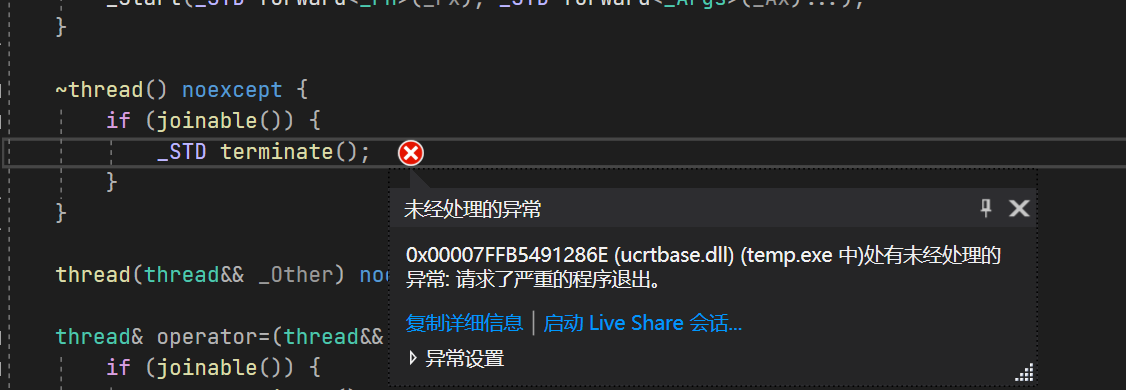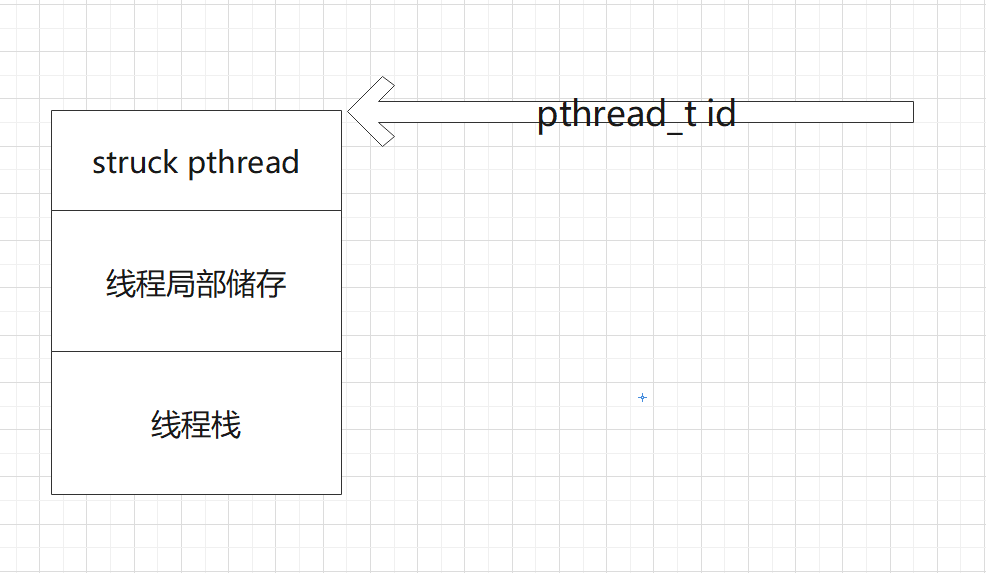多线程编程与资源同步
在Windows下,主线程退出后,子线程也会被关闭;
在Linux下,主线程退出后,系统不会关闭子线程,这样就产生了僵尸进程
3.2.1创建线程
- Linux 线程的创建
#include <unistd.h>
#include <stdio.h>
#include <pthread.h>
void\* threadfunc(void\* arg)
{
while (1)
{
sleep(1);
printf("I am a new thread!!!\n");
}
return NULL;
}
int main()
{
pthread_t threadid;
pthread\_create(&threadid, NULL,threadfunc, NULL);
while (1)
{
}
return 0;
}
- Windows CRT1提供的线程创建函数
#include <process.h>
#include <stdio.h>
unsigned int __stdcall threadfun(void\* args)
{
while (true)
{
printf("I am new thread!");
}
return 0;
}
int main(int argc,char\* argv[])
{
unsigned int threadid;
\_beginthreadex(0, 0, threadfun, 0, 0, &threadid);
while (true)//不让主线程退出
{
}
return 0;
}
- C++ 提供的
std::thread类
#include <iostream>
#include <thread>
void threadproc1()
{
while (true)
{
printf("I am aNew Thread!!");
}
}
void threadproc2(int a,int b)
{
while (true)
{
printf("I an Thread2");
}
}
int main()
{
std::thread t1(threadproc1);
std::thread t2(threadproc2, 1, 2);
while (true)
{
}
}
这种方法容易出错,原因如下:
#include <iostream>
#include <thread>
void threadproc1()
{
while (true)
{
printf("I am aNew Thread!!");
}
}
void func()
{
std::thread t(threadproc1);
}
int main()
{
func();
while (true)
{
}
}
这段代码实际上试运行不了的,在vs2019 release模式下结果:

在func函数调用完成后,func中的局部变量t被销毁,而此时线程函数仍然在运行.所以使用std::thread创建线程必须保证线程函数运行期间,线程对象始终有效!!
当然,我们也可以使用detach方法解决这个问题,使线程函数和线程对象脱离
...
void func()
{
std::thread t(threadproc1);
t.detach();
}
...
这样就可以运行了,但是不推进这样做,因为我们需要线程对象对线程进行管理
3.2.2线程ID
下面介绍一下Linux系统线程ID本质
- Linux系统线程ID本质
在Linux系统中有三种方法可以获取一个线程的ID
+ 调用`pthread_create`函数时,可以通过第一个参数获取线程ID
+ 在需要获取ID的线程中调用`pthread_self`函数获取
+ **通过系统调用获取线程ID**其中,方法一和方法二获取线程ID的结果都是一样的,都是`pthread_t`类型

不同的进程可能有同样的地址内存块(共享内存),所以通过方法一和方法二获取到的线程ID可能不是全系统唯一的,而方法三获取的线程ID是全系统唯一的,就是LWP(轻量级进程)2
- C++ 获取线程ID的方法
#include <thread>
#include <iostream>
#include <sstream>
void worker\_thread\_func()
{
while (true)
{
}
}
int main()
{
//获取线程t的id
std::thread t(worker_thread_func);
std::thread::id worker_thread_id=t.get\_id();
std::cout<<worker_thread_id<<std::endl;
//获取主线程的id
std::thread::id main_thread_id = std::this_thread::get\_id();
std::cout<<main_thread_id<<std::endl;
while (true)
{
}
}
运行结果(ubuntu20):

3.2.3 等待线程结束
- 在Linux下等待线程结束
Linux 线程库提供了pthread_join函数,用来等待某线程的退出并接收他的返回值
这种操作被称为汇接(join)
Declared in: pthread.h
static int pthread\_join(pthread_t __th, void \* \*__thread_return)
参数__th是需要等待的线程ID;参数__thread__return是输出参数,用于接受被等待线程的退出码,
可以再调用pthread_exit()时指定退出码
Declared in: pthread.h
static void pthread\_exit(void \*__retval)
其中__retval可以通过__thread_return参数获得
下面来展示一个实例,在程序启动时开启一个工作线程,工作线程将当前系统时间写入一个文件后,主线程等待工作线程退出后,从文件中读取时间,并将其输出
#include <cstdio>
#include <string>
#include <pthread.h>
#include <cstring>
#define TIME\_FILENAME "time.txt"
void\* fileThreadFunc(void\* arg)
{
time_t now = time(nullptr);
tm\* t = localtime(&now);
char timeStr[32]={0};
snprintf(timeStr,32,"%04d/%02d %02d:%02d:%02d",
t->tm_year+1900,
t->tm_mon+1,
t->tm_mday,
t->tm_hour,
t->tm_min,
t->tm_sec);
FILE\* fp = fopen(TIME_FILENAME,"w");
if(fp == nullptr)
{
printf("打开文件(time.txt)失败\n");
return nullptr;
}
size_t sizeToWrite=strlen(timeStr) +1;
size_t ret = fwrite(timeStr,1,sizeToWrite,fp);
if(ret != sizeToWrite)
{
printf("写入错误!\n");
}
fclose(fp);
return nullptr;
}
int main()
{
pthread_t fileThreadID;
int ret = pthread\_create(&fileThreadID, nullptr,fileThreadFunc, nullptr);
if(ret != 0)
{
printf("创建线程失败\n");
return -1;
}
int\* retval;
pthread\_join(fileThreadID,(void\*\*)&retval);
FILE\* fp = fopen(TIME_FILENAME,"r");
if(fp == nullptr)
{
printf("打开文件失败!\n");
return -2;
}
char buf[32] = {0};
int sizeRead = fread(buf,1,32,fp);
if(sizeRead == 0)
{
printf("读取文件失败");
fclose(fp);
return -3;
}
printf("Current time is: %s.\n",buf);
fclose(fp);
return 0;
}
执行结果如下:

- Windows 等待线程结束
在Windows下我们可以使用WaitForSingleObject function (synchapi.h)和WaitForMultipleObjects function (synchapi.h)
- C++11提供的等待线程结束的函数
#include <cstdio>
#include <cstring>
#include <thread>
#define TIME\_FILENAME "time.txt"
void fileThreadFunc()
{
time_t now = time(nullptr);
tm\* t = localtime(&now);
char timeStr[32]={0};
snprintf(timeStr,32,"%04d/%02d %02d:%02d:%02d",
t->tm_year+1900,
t->tm_mon+1,
t->tm_mday,
t->tm_hour,
t->tm_min,
t->tm_sec);
FILE\* fp = fopen(TIME_FILENAME,"w");
if(fp == nullptr)
{
printf("打开文件(time.txt)失败\n");
return ;
}
size_t sizeToWrite=strlen(timeStr) +1;
size_t ret = fwrite(timeStr,1,sizeToWrite,fp);
if(ret != sizeToWrite)
{
printf("写入错误!\n");
}
fclose(fp);
return;
}
int main()
{
std::thread t(fileThreadFunc);
if(t.joinable()) t.join();
FILE\* fp = fopen(TIME_FILENAME,"r");
if(fp == nullptr)
{
printf("打开文件失败!\n");
return -2;
}
char buf[32] = {0};
int sizeRead = fread(buf,1,32,fp);
if(sizeRead == 0)
{
printf("读取文件失败");
fclose(fp);
return -3;
}
printf("Current time is: %s.\n",buf);





















 7465
7465

 被折叠的 条评论
为什么被折叠?
被折叠的 条评论
为什么被折叠?








